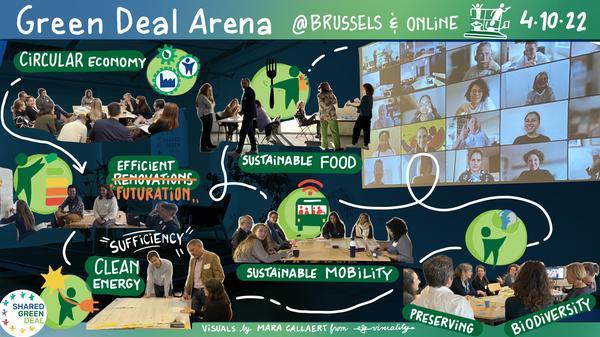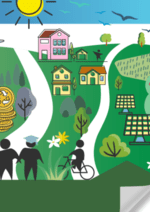Report: Pathways to a more just & sustainable Europe
What’s best and fairest for EU citizens looking out to 2050? To break that down, DRIFT organised a series of three Transition Arena events, discussing this question for six EU Green Deal policy priority areas. A new report synthesises what the +180 participants saw as the state of transitions in Europe, and what pathways lie ahead towards a more just and sustainable Europe in 2050.
Europe, like the rest of the world, is being released from the grip of the pandemic and the accompanying restrictions. It was with this newfound appreciation of the physical, social, and cultural interactions that were previously hard or impossible, that DRIFT organised a Transition Arena event series as part of the EU funded SHARED GREEN DEAL project.
So hope was in no short supply: now, we’d build back better societies. Yet it’s also becoming clear that, no matter how disruptive, a global pandemic alone won’t permanently change the unsustainable and unjust threads in the fabric of our lives. And with a war on our doorstep pressuring our energy and food systems (among others), it’s been a particularly hard year to determine what’s best and fairest for EU citizens.
For these arena events, DRIFT recruited 189 changemakers working locally, nationally and at the pan-European level. These policy workers, government officials, entrepreneurs, researchers and other folks to discuss – hopefully and cautiously – justice and sustainability across six Green Deal policy priority areas: from clean energy to the circular economy, from biodiversity to mobility and from food to renovations.
The results are presented in a new report, in which you can find the results of their co-creative efforts over the second half of 2022. What did the participants already see happening ‘out there’ contributing to Green Deal objectives in practice? And what future images and transition pathways did participants see towards a just and sustainable 2050?
Creating these multiple, and sometimes conflicting pathways together with all participants highlighted the need for social justice, a strong role of government, substantial renewal of the economic system, and substantial changes in how EU citizens will conduct their everyday lives. In that sense, SHARED GREEN DEAL aims to contribute to the awareness both of the breadth and intrusiveness of the Green Deal and of its necessity.
Find the full report here.
Related Green Deal Priorities
Related Resources


CONTACT
For further details please contact co-leads Professor Chris Foulds (chris.foulds@aru.ac.uk) and Professor Rosie Robison (rosie.robison@aru.ac.uk).

This project has received funding from the European Union’s Horizon 2020 research and innovation program under grant agreement No 101036640. The sole responsibility for the content of this website lies with the SHARED GREEN DEAL HAS project and does not necessarily reflect the opinion of the European Union.

